 Tulane Center for Eosinophilia Disorders under the leadership of Dr. Anil Mishra, PhD, is a first center in the southern region of USA. The center will provide an opportunity to the researchers, patients and their families to understand the disease and consult for the better treatment of the eosinophil associated disorders. The center will also provide an opportunity to the basic research scientist to directly translate their experimental findings to the human disease with the help of clinicians. The center will be involved in basic, clinical and translational studies to determine the mechanistic aspects of eosinophilic disorders in the lung, skin and multiple gastrointestinal segments.
Tulane Center for Eosinophilia Disorders under the leadership of Dr. Anil Mishra, PhD, is a first center in the southern region of USA. The center will provide an opportunity to the researchers, patients and their families to understand the disease and consult for the better treatment of the eosinophil associated disorders. The center will also provide an opportunity to the basic research scientist to directly translate their experimental findings to the human disease with the help of clinicians. The center will be involved in basic, clinical and translational studies to determine the mechanistic aspects of eosinophilic disorders in the lung, skin and multiple gastrointestinal segments.
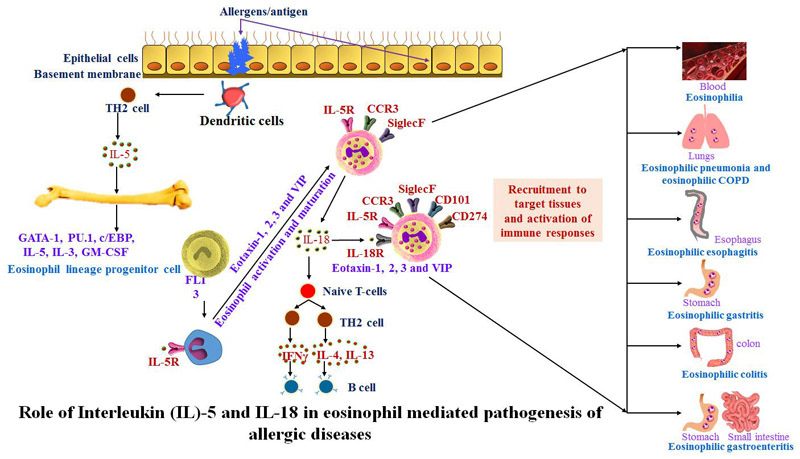
The center's aim is to develop diagnostic and therapeutic interventions for eosinophil associated allergic diseases. Eosinophilic disorders occur when eosinophils, white blood cells with a bilobed nucleus with multiple toxic granules white blood cell, are found in above-normal amounts in various parts of the body. Eosinophil resides in the gastrointestinal tract of healthy individuals https://www.jci.org/articles/view/6560 and https://www.jci.org/articles/view/10224; however, during allergic (food or aeroallergen) responses, a large number of eosinophils are generated from their precursors in bone marrow that move into the responsive organ of the body. We recently discover that the eosinophils generated during the allergic diseases are different then the eosinophils reside in healthy state. The pathogenic eosinophils that are generated in allergic condition and move to the diseased organs express cell surface molecules CD101 and CD274 https://www.jacionline.org/article/S0091-6749(18)30297-5/fulltext. These CD10+CD274+ eosinophils release a variety of toxins that can cause chronic inflammation, resulting in tissue damage.
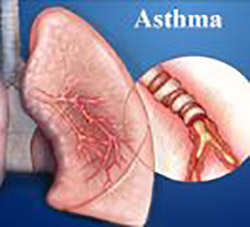
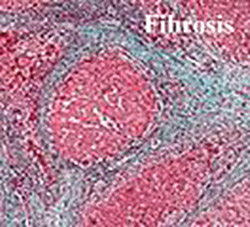

We and others reported that eosinophils have a major role in promoting asthma, eosinophilic esophagitis (EoE) (https://www.sciencedirect.com/science/article/pii/S0016508507017994; https://www.nejm.org/doi/10.1056/NEJM199010113231505?url_ver=Z39.88-2003&rfr_id=ori:rid: crossref.org&rfr_dat=cr_pub%20%200www.ncbi.nlm.nih.gov) and a number of other gastrointestinal symptoms and tissue remodeling (fibrosis) and most recently found their accumulation and role in inflammation mediated pancreatic malignancy (https://www.ncbi.nlm.nih.gov/pmc/articles/PMC5945222/). Because of the growing knowledge and a better diagnostic technology, we now have a better understanding of a number of allergic diseases. We are currently studying multiple compounds that might block eosinophil production and their recruitment into the tissues. Our research work indicated that in the future our center may provide the best treatment for eosinophil-associated multiple medical disorders such as asthma, eosinophilic esophagitis, and other eosinophil associated gastrointestinal disorders, including eosinophils-induced pancreatitis and malignancy.
Basic and Clinical Studies at Our Center
The major goal of Dr. Mishra's research is aimed to elucidate the mechanism inflammatory cells recruitment and their impact on immunological and pathological responses in eosinophilic gastrointestinal disorders [eosinophilic esophagitis (EoE) and eosinophilic gastritis (EG)], asthma, inflammatory cells induced pancreatitis, chronic pancreatitis and malignancies. Further, to translate the experimental findings into human novel therapeutic and diagnostic interventions. Dr. Mishra working in the area of inflammatory cells including eosinophils, mast cells, T cells biology from at least more than 2 decades and very much interested in defining the role of eosinophils in health and disease.
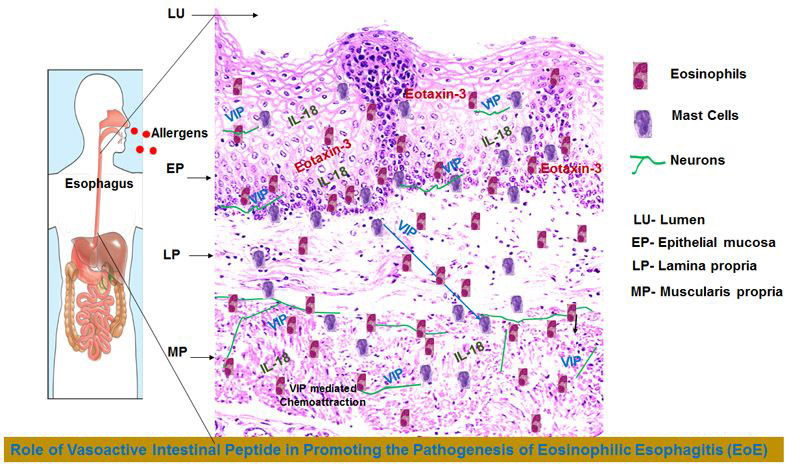
- Immune signaling molecules involved in promoting the pathogenesis of eosinophilic esophagitis (EoE). Recently, we first time implicated the role of IL-18 in eosinophils biology including maturing the naïve eosinophils into the CD101/CD274 double positive pathogenic eosinophils and these eosinophils have a critical role in promoting eosinophil associated gastrointestinal diseases (https://www.jacionline.org/article/S0091-6749(18)30297-5/fulltext) Currently, our current research is focused toward understanding the mechanisms that nerve cell derived VIP via its specific receptors present on eosinophils and mast cells have an important role on accumulation and activation in and beyond the esophageal epithelial mucosa that likely promotes pathophysiological functional abnormalities in eosinophilic esophagitis (EoE) (https://www.ncbi.nlm.nih.gov/pmc/articles/PMC5736881/) Additionally, we are working on establishing the clinical significance of IL-18 and its responsive eosinophils in asthma. We hope by targeting the molecules responsible for transforming naïve eosinophils to pathogenic eosinophils we will provide therapeutic intervention for eosinophilic asthma and esophageal functional abnormalities in EoE. Below we show a summarized mechanistic schematic diagram of naive eosinophils generation, transformation to pathogenic eosinophils and their accumulation in EoE or asthma.
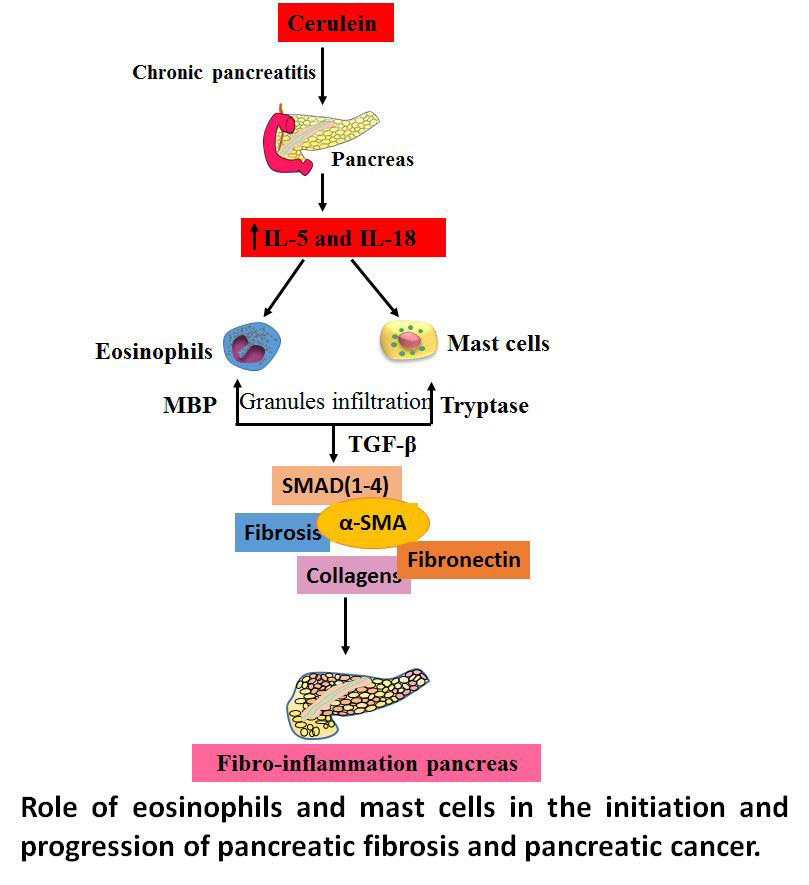
- IL-18 role in the progression of Chronic eosinophilic pancreatitis and pancreatic malignancy. Our other focused area of research is on the pathogenesis of acute and chronic pancreatitis including pancreatic malignancy.
Research Focus Areas
Eosinophilic Gastrointestinal Disorders:
Eosinophilic esophagitis, characterized by elevated levels of eosinophil in the esophagus.
Eosinophilic gastritis, characterized by elevated eosinophil in the stomach.
Eosinophilic colitis, characterized by excessive eosinophil in the colon.
Eosinophilic Pancreatitis and pancreatic malingnancy, characterized by the accumulation of excessive eosinophils in the pancreas
Clinical Collaborators:
Asthma, is a chronic inflammatory disease of the airways caused by a combination of genetic and environmental factors and characterized by airflow obstruction, and bronchospasm. Common symptoms include wheezing, coughing, chest tightness, and shortness of breath.
Dr. Nereida Parada, MD (Associate Professor, Pulmonary Medicine. Tulane Medical Center, New Orleans, LA)
Clinical Collaborators:
Fibrosis can occur in many tissues within the body, typically as a result of inflammation or damage, and examples include.
- Pulmonary fibrosis (lungs) includes, Idiopathic pulmonary fibrosis.
Dr. Joseph Lasky, MD (Professor and Director, Pulmonary Medicine. Tulane Medical Center, New Orleans, LA)
Clinical Collaborators:
Dr. Laurianne Wild, MD (Professor and Director, Clinical Immunology, Tulane Medical Center, New Orleans, LA
Off Site Collaborative Partner and ConsultantsDr. Melisa A. Spera, MD (Assistant Professor of Clinical Medicine, Section of Gastroenterology LSU Health Science Center, New Orleans, LA). Collaborating to understand the mechanism operational in human EoE pathogenesis.
Dr. Michael F. Vaezi, MD. PhD (Professor of Medicine, Director of the Center for Swallowing and Esophageal Disorders, Vanderbilt University Medical Center, Nashville, TN). Collaborating to understand the mechanism operational in the development of esophageal functional abnormalities in human EoE.
Dr. Arnold H. Zea, PhD (Associate Professor of Microbiology, Stanley S. Scott Cancer Center, LSU Health Sciences Center New Orleans (LSUHSC), New Orleans, LA). Collaborating to obtain human biospecimens.
Jennifer Gnerlich, MD (Assistant Professor of Clinical Surgery, Division of Surgical Oncology, Department of Medicine-Gastroenterology, LSU Health Sciences Center-New Orleans, LA). Collaborating to understand the mechanism operational in the development of esophageal inflammation and it’s role in promoting malignancy in human pancreas.
How to give to Eosinophilic Disorder CenterYou can join us in fulfilling our research mission to finding a permanent cure for eosinophil related disorders of the lung, skin and gastrointestinal track. Donations are very appreciated for diagnostic and therapeutic interventions.
Contributions may be made by check to:
Tulane University
Department of Pulmonary Diseases and Critical Care Medicine
1430 Tulane Ave., #8509
New Orleans, LA 70112
You may designate one of our research or education priorities. All contributions are tax-deductible.For more information to donate to our center, please contact Charlene Esteves (cesteves@tulane.edu) at 504-988-3541.
Our Research Highlights- Eosinophils are the resident cell that home prenatally in gastrointestinal tract. J. Clin. Invest. 1999 - (https://www.jci.org/articles/view/6560)
- Developed a murine model of asthma associated eosinophilic esophagitis. J. Clin. Invest. 2001- (https://www.jci.org/articles/view/10224)
- Esophageal remodeling develops as a consequence of tissue specific IL-5 induced eosinophilia. Gastroenterology. 2008 - (https://www.sciencedirect.com/science/article/pii/S0016508507017994)
- Interleukin-15 Expression Is Increased in Human eosinophilic esophagitis and Mediates Pathogenesis in Mice. Gastroenterology. 2010 - (https://www.sciencedirect.com/science/article/pii/S0016508510005147)
- Experimental eosinophilic esophagitis induced esophageal functional impairment. AJP-Gastroenterology & Liver Physiol. 2009 - (https://journals.physiology.org/doi/full/10.1152/ajpgi.00148.2009)
- Invariant natural killer T cells neutralization is a possible novel therapy for human eosinophilic esophagitis. Clinical and Translational Immunology. 2014 - (https://onlinelibrary.wiley.com/doi/full/10.1038/cti.2013.13)
- Involvement of Interleukin-18 in the pathogenesis of human eosinophilic esophagitis. Clinical Immunology. 2015 - (https://www.sciencedirect.com/science/article/pii/S1521661615000261)
- Possible Noninvasive Biomarker of Eosinophilic Esophagitis: Clinical and Experimental Evidence. Case Reports in Gastroenterology. 2016 - (https://www.karger.com/Article/FullText/452654)
- Significance of eosinophils in promoting pancreatic malignancy, Journal of gastroenterology, pancreatology & liver disorders. 2017 - (https://www.ncbi.nlm.nih.gov/pmc/articles/PMC5945222/)
- Regulatory effects of Interleukin (IL)-15 on allergen-induced airway obstruction. J. Allergy and Clinical Immunology. 2018 - (https://www.sciencedirect.com/science/article/pii/S0091674917309260)
- Role of eosinophils in the initiation and progression of pancreatitis pathogenesis. American Journal of Physiology-Gastrointestinal and Liver Physiology. 2018 - (https://journals.physiology.org/doi/full/10.1152/ajpgi.00210.2017)
- Role of Vasoactive Intestinal Peptide in Promoting the Pathogenesis of Eosinophilic Esophagitis (EoE). Cell Mol Gastroenterol Hepatol. 2018 - (https://www.ncbi.nlm.nih.gov/pmc/articles/PMC5736881/)
- IL-15 regulates fibrosis and inflammation in a mouse model of chronic pancreatitis. American Journal of Physiology-Gastrointestinal and Liver Physiology. 2019 - (https://journals.physiology.org/doi/full/10.1152/ajpgi.00139.2018)
- Role of IL-18 in differentiation, maturation, activation and transformation of pathogenic eosinophils. J Allergy. Clin. Immunol. 2019 - (https://www.jacionline.org/article/S0091-6749(18)30297-5/fulltext)
- Intestinal overexpression of IL‐18 promotes eosinophils‐mediated allergic disorders. Immunology. 2019 - (https://onlinelibrary.wiley.com/doi/full/10.1111/imm.13051)
Past Laboratory Members- James Schlotman, MD. Joined in 2004 after completing his undergraduate (BS) from Drexel University, Philadelphia. James joined my laboratory at Cincinnati Children’s Hospital Medical Center, Cincinnati and worked more than two years on T cells role in EoE and Resistin like molecule-beta on remodeling till June 2007. He left the laboratory after getting admission in University of Cincinnati College of Medicine, Cincinnati, Ohio and completed MD in 2011-12. He is currently working as a physician at College of Medicine in Houston, Texas.
- Zeenath Unnisa, PhD. Joined in 2004 after completing her PhD from Osmania University, Hyderabad, India. Zeenath, worked in my laboratory at Cincinnati Children’s Hospital Medical Center, Cincinnati as a postdoctoral fellow and worked on mast cell role in EoE. Current position and place of work not known.
- Venkatarajani R, MS. Joined as a research assistant in my laboratory at Cincinnati Children’s Hospital Medical Center, Cincinnati and worked on esophageal remodeling. Current, position and place of work is not known.
- Mequin Wang, MD, PhD. Joined in 2005 as a research associate after completing her PhD from John Hopkins School of Medicine, Baltimore. Mequin, worked in my laboratory at Cincinnati Children’s Hospital Medical Center, Cincinnati till 2008 on esophageal remodeling in EoE and regulatory T cells role in EoE. Currently she is working as Assistant professor at Children’s Hospital, Denver, CO.
- Calab H. Crump, BS. Joined in 2005 as a research assistant from University of Cincinnati after completing his undergraduate studies. Calab worked in my laboratory at Cincinnati Children’s Hospital Medical Center, Cincinnati till 2008. He re-joined Law College and currently doing private practice.
- Xiang Zhu,PhD. Joined in 2007 as a postdoctoral fellow, in the University of Cincinnati. Xiang, moved to my laboratory at Cincinnati Children’s Hospital Medical Center, Cincinnati in 2009 and worked on the role of IL-15 and regulatory T cells in EoE. Dr. Zhu is currently working as junior faculty Cincinnati Children’s Hospital, Cincinnati, OH.
- Parm Mavi, MS. Joined in 2010 as a research assistant, from University of Cincinnati after completing BS. Parm, worked in my laboratory at Cincinnati Children’s Hospital Medical Center, Cincinnati till 2012 on mast cells and eosinophil role in the development of esophageal functional abnormalities in EoE. Parm recently completed MD and working as resident at University of Cincinnati College of Medicine, Cincinnati, OH.
- Akhilesh Pandey, PhD. Joined in 2012 as a visiting postdoctoral fellow for 3 months in my laboratory at Cincinnati Children’s Hospital Medical Center, Cincinnati and currently working as an Instructor at Garner’s Institute of Aging in Texas.
- Shankar Narayann, BS. Joined in 2011 as a research assistant after graduating from Ohio State University. Shankar, worked in my laboratory at Cincinnati Children’s Hospital Medical Center, Cincinnati till 2011 and currently completing his Medical Degree (MD) at Wright College of Medicine, Dayton, Ohio.
- Priya Rajuvelu, PhD. Joined in 2009 as a research associate, from University of Cincinnati after 6 months of postdoctoral training in Dr. Chaubey’s laboratory. Priya worked in my laboratory at Cincinnati Children’s Hospital Medical Center, Cincinnati till 2012 on the role of IL-15 and IL-18 on eosinophil biology and EoE pathogenesis. She is currently working as Assistant Scientist at University of Cincinnati, OH.
- Madhavi Rayapudi, MBBS, MD. Joined in 2008 as a research associate. She was a Medical graduate from Guntur Medical School, Guntur, AP, India. Madhavi, worked in my laboratory at Cincinnati Children’s Hospital Medical Center, Cincinnati till 2013 on a number of projects that included food and indoor allergen-induced EoE, INKT cells role in EoE and non-invasive biomarkers for EoE. She is currently doing her fellowship in pathology at Mayo clinic.
- Scott Dynda, MS. Joined in 2012 as a research assistant after completing his master degree from Kent State University Kent, OH. Scott worked in my laboratory at Case Western Reserve University, Cleveland till 2013, on the role of IL-15 in lung and intestinal diseases. He is currently working as Laboratory Manager at Cleveland Clinic, Cleveland, Ohio.
- Rituraj Niranjan, PhD. Joined in 2011 as a postdoctoral fellow after doing his initial research training at Central Drug Research Center, Lucknow, India and obtained his PhD from Jawaharlal Nehru University, New Delhi, India. Rituraj worked in my laboratory at Cincinnati Children’s Hospital Medical Center and further continued his research to Case Western Reserve University. He worked on the IL-15 biology and its role in allergen-induced airway hyperreactivity and lung fibrosis. Currently, he is working as Scientist-C at Indian Institute of Medical Research, India.
- Parmesh Dutt, PhD. Joined in 2012 as a postdoctoral fellow after losing a grant and closing of FDA sponsored research laboratory at Washington DC. He worked in my laboratory at case Western and Tulane University on eosinophilia subsets identification and eosinophilic inflammation in lung and esophagus. Currently joined Food and Drug Administration, USA as a Scientist.
- Asifa Zaidi, PhD. Joined in 2012 as a postdoctoral fellow after losing a postdoctoral job at John Hopkins School of Medicine due to loss of NIH funding by his supervisor. Asifa obtained her PhD in biosciences from Bhabha Atomic Research Center, Mumbai, India and had her postdoctoral training at John Hopkins Medical School, Baltimore. She left in 2014 and currently working as Statistical analysis at Case Western Reserve University, Cleveland, OH.
- Aditi Mathur, PhD. Aditi joined our laboratory as a postdoctoral fellow in 2014 and moved to Chicago, IL due to the some family reason. Aditi obtained his PhD from Tulane University School of Medicine, New Orleans, LA in 2014 and recently joined Eosinophilic Disorder Center at New Orleans, LA. Current place and position is not known.
- Jai Shankar Shukla, PhD. Jai shankar obtained his PhD from Kanpur University, India and he is a staff member at Sanjay Gandhi Postgraduate Medical Institute at Lucknow, India. He came to my laboratory for a year on study leave to learn some molecular and immunology techniques in December 2013 and worked till 2015. He is currently working at Staff Member at Sanjay Gandhi Post Graduate Institute (SGPGI) Lucknow, India.
- Rakesh Mishra, PhD. Postdoctoral fellow. Joined in 2014 as a postdoctoral fellow to work on the role of IL-18 and IL-15 celiac disease. Rakesh obtained his PhD from Patel Chest Research Center, New Delhi, India and completed two years of postdoctoral training at University of Illinois, Chicago. Currently placed in New York, NY. He is currently working at Staff Member at Sanjay Gandhi Post Graduate Institute (SGPGI) Lucknow, India.
- Ruijuan Gao, PhD. Postdoctoral fellow. She joined our laboratory in 2014 as a Research Associate and currently working as Data Analyst in a private farm at Florida.
- Siddesha J. Mariswamy, PhD. Postdoctoral fellow. Siddesha obtained his PhD from University of Mysore, Mysore, Karnataka, India, and has done his postdoctoral training at NIH and joined Tulane eosinophilic disorder center in 2014. He is currently working as staff member, India.
- Anshi Shukla, PhD. Postdoctoral fellow. Anshi completed her PhD degree from BHU, Varanasi, India. Joined our laboratory in 2014 as a pre-doctoral fellow and currently moved to the Transplant Clinic, Washington University, Washington, DC.
- Dewan Majid, MD. Joined recently Tulane eosinophilic Disorder Center after completing MD degree from Tulane University School of Medicine, New Orleans, LA. Dr. Majid is doing Residency at St. Louis, MS
- Chandrashekara P. Madhadevappa, PhD. Joined Tulane Eosinophilic disorder Center in July 2015 and worked on CXCR4/SDF1 pathway in EMT associated esophageal functional disorders in EoE. Chandrashekhera obtained his PhD degree from University of Mysore, Karnataka, India. Currently Dr. Madhadevappa moved back to India in July 2016 joined faculty position in Mysore, India
- Murli Manohar, PhD. Joined Tulane Eosinophilic disorder center in May 2015 and worked on the role of IL-15 in the pathogenesis of acute and chronic pancreatic fibrosis. Murli, obtained his PhD from Central drug Research institute (CSIR) Lucknow, India. Currently Dr. Manohar moved in Feb 2018 to Stanford University, San Francisco, CA for his further training in research.
- Alok K. Verma, PhD. Joined Tulane Eosinophilic Disorder Center in July 2015 and working on the role of vasoactive intestinal peptide in eosinophil trafficking in the muscular mucosa. Dr. Verma graduated in 2014 and obtained his PhD degree from Indian Toxicology research Center, Lucknow, India. Dr. Verma moved to Cincinnati Children’s Hospital Medical Center in 2018.
- Sathisha U. Venkateshaiah, PhD. Joined the Tulane eosinophilic disorder center in July 2014 and worked on the IL-15 role in airway resistance and compliance following the induction of experimental asthma. Additionally he showed a critical role of IL-18 in eosinophils. Dr. Venkateshaiah is now promoted to the faculty position at Tulane School of Medicine and he is now managing my laboratory research and guiding new postdoctoral fellows and students.
- Hemanth K. Kandikattu, PhD. Joined Tulane Eosinophilic Disorder Center in March 2018 and working on pathogenesis of acute and chronic eosinophil associated pancreatic fibrosis and Malignancy. Hemanth obtained his PhD from the Defense Food Research laboratory/University of Mysore, Karnataka, India. Before joining my laboratory Hemath worked at University of Missouri, Columbia, Missouri from 2015 to March 2018 on the project involving the role of RECK (Reversion inducing cysteine rich protein with kazal motifs) and TRAF3IP2 in cardiac hypertrophy, fibrosis and obesity.
- Sandeep Kumar, PhD. Joined Tulane Eosinophilic Disorder Center in 2020 and working on pathogenesis of acute and chronic eosinophil associated esophageal disorders. Sandeep Kumar obtained his PhD from the King George’s Medical University, Lucknow, India. Earlier he completed National Post-Doctoral Fellowship training in autoimmune disease from Sanjay Gandhi PGIMS, Lucknow, India from June 2015 to July 2018.
Past StudentsThe following high school/graduate students were introduced to medical research in summer (June-August) of all years and trained in my laboratory.
- Kalyan M. Rao, 2008 May-July, Currently working as Statistical Analyst at Proctor and Gamble, Cincinnati, Ohio
- Srichandan Rajmouli, 2008 May-July, Currently Medical student at Collage of Medicine University of Cincinnati, OH
- Mathew Moffitt, 2009 May-July, Valpariso University, Indiana. Currently Medical student in Indiana.
- Birva Dave, 2009 May-July, Anderson High School, Cincinnati, Ohio. Currently working as Pharmacist in Florida
- Anupreet K.Lekhi, 2010 May-July, Ohio State University, Columbus, Ohio.
- Archit Sahay, 2012 May-July, Ohio State University, Columbus, Ohio. Currently doing medical education in Toledo, Ohio
- Akanksha Mishra, 2012 June-August, University of Cincinnati, Ohio. Currently doing her medical studies.
- Prithvi Jami, 2013 JUNE-AUGUST, Currently doing medical education in Toledo, Ohio
- Ahaad Mushad, 2014,November-June 2014. Independent research student , currently doing his medical education in LSU.
- Nathan Sanders 2015-16 Independent research student to complete his undergraduate course for Tulane University, New Orleans, LA Currently doing his academic medical education (MD, PhD) in Boston, MA
- Arjun Verma, 2016- Independent research student to complete his undergraduate course for Tulane University, New Orleans, LA
Current Faculty and Postdoctoral Fellows
- Chandra Sekhar Yadavalli, Ph.D., joined Tulane Eosinophilic Disorder Center on Feb 1st, 2021, and is working on the "pathogenesis of acute and chronic eosinophil associated esophageal disorders". He received his Ph.D. degree from Bharathiar University in Coimbatore, India. Cell biology, Immunology, Molecular biology, and Biochemistry are his areas of specialization. Earlier, he worked as a Postdoctoral fellow at IISER Tirupati on the "NF-kB signaling pathway" from June 2019 to Jan 2021. He published nearly 28 articles in National and International journals.
- Chandra Sekhar Kathera, PhD. In 2022, he joined the Tulane Eosinophilic Disorder Center to work on MMP-12 Heterogeneity and Its Influence on Eosinophilic Esophagitis (EoE). Chandra Sekhar received his Ph.D. from Sri Venkateswara University in Tirupati, INDIA. He previously completed a Post-Doctoral Fellowship at Yeungnam University in South Korea in Recombinant Protein Purification and Lab Grown Meat Development Media Optimization. Between June 2021 and October 2022
